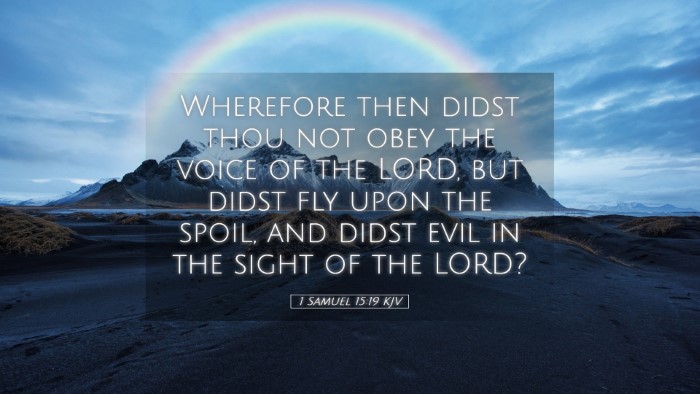Commentary on 1 Samuel 15:19
Verse: “Wherefore then didst thou not obey the voice of the Lord, but didst fly upon the spoil, and didst evil in the sight of the Lord?”
Introduction
This verse takes place during the aftermath of King Saul's disobedience to God's command regarding the Amalekites. Here, the prophet Samuel confronts Saul, highlighting the gravity of his actions and the dire consequences of turning away from divine instruction. This commentary aims to explore various facets of this passage, drawing insights from esteemed public domain commentaries.
Contextual Overview
In the broader narrative of 1 Samuel 15, God commands Saul to utterly destroy the Amalekites and all that belongs to them. However, Saul disobeys, sparing King Agag and keeping the best of the livestock. When Samuel confronts Saul, he points out the seriousness of Saul's failure to adhere to God's command.
Historical Background
The Amalekites represent a long-standing enemy of Israel, and their destruction was part of divine justice against their persistent opposition to God’s plan for His people. This background informs the depth of Saul's disobedience and highlights the importance of complete obedience in fulfilling God's will.
The Divine Command
According to Matthew Henry, God's command to destroy the Amalekites was both a judgment against their iniquity and a means for Israel to purge sin from their midst. Henry emphasizes that the partial obedience displayed by Saul is a reflection of human nature’s tendency to justify disobedience when the cost seems high.
Interpretation of Saul's Actions
Adam Clarke elaborates that Saul's decision to spare Agag and the best livestock was rooted in his desire for personal gain and prestige. This action demonstrates a fundamental misunderstanding of God's will and character, leading Saul to prioritize human judgment over divine command.
Spiritual Implications
The question Samuel poses is pivotal not just in the historical context but spiritually as well. In ignoring God’s command, Saul's actions reflect a broader theological truth about the nature of obedience to God. As Albert Barnes clarifies, Saul's failure is a warning against the human inclination to follow our desires instead of God's directives.
Theological Reflections
The confrontation between Samuel and Saul brings to light several theological principles applicable to both leaders and laypersons:
- The Call for Complete Obedience: The notion that God requires total allegiance is paramount. This goes beyond mere ritualistic behavior—it calls for a heart aligned with His will.
- The Danger of Justification: Saul attempts to justify his actions by claiming that the spared livestock were to be offered as sacrifices to God. This move towards rationalization showcases the human propensity to add conditions to obedience.
- Consequences of Disobedience: Henry notably remarks on the irrevocable consequences of Saul’s actions, indicating that disobedience can lead to a loss of favor and the subsequent withdrawal of God's presence.
Consequences of Saul's Disobedience
In this verse, Samuel's question serves as a rhetorical tool to emphasize the folly and futility of Saul's decisions. The actions Saul took brought not only personal downfall but also national implications for Israel. As Clarke notes, leadership comes with the weight of consequence, and Saul's misdeeds would reverberate throughout the kingdom.
Application for Today
The lessons from 1 Samuel 15:19 remain profoundly relevant in contemporary Christian life. For pastors, students, theologians, and scholars, this passage is a call to examine areas of personal and communal disobedience:
- Evaluating Priorities: Believers are challenged to assess whether their decisions align fully with God's commands, avoiding the tendency to prioritize their desires over divine instructions.
- Understanding God's Heart: It calls for a deeper understanding of God's intent, moving beyond surface-level obedience into a relational context where God's desires are prioritized.
- Embracing Accountability: Just as Saul faced Samuel, individuals are encouraged to seek accountability and to stand firmly against rationalizing disobedience.
Conclusion
1 Samuel 15:19 offers a sobering reminder of the critical importance of obedient discipleship in the life of believers. Through the lens of public domain commentaries, we see the intricacies of Saul's failure and the profound implications it holds for us today. In our walk of faith, may we heed the clarion call to obey the voice of the Lord with unwavering commitment, recognizing the sacred nature of God's commands and the eternal consequences of our choices.


